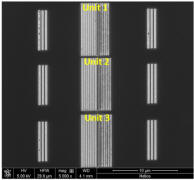Time:2013-11-19ClickTimes:
Surface plasmon polariton (SPP) launcher, performing functions of photon-to-SPP
conversion and subsequent SPP launching in the required direction, acts as a
kind of on-chip SPP source, having great potential applications in the fields of
integrated plasmonic circuits and devices. However, the obstacle is how to
achieve a wideband, high launching efficiency ratio, and large extinction ratio
for unidirectional SPP launcher simultaneously. The all-optical logic
discriminator, as one of the important complex all-optical logic gates,
functions as discriminating and encoding incident light signals according to
wavelength. However, there is no any report about the integrated all-optical
logic discriminator at the nano scale, which has seriously restricted the study
of ultrahigh speed and ultrawide-band information processing based on integrated
plasmonic chips.
Gong’s group proposes a chirped plasmonic crystal configuration to achieve an
ultrawide energy bandgap, so that the SPPs can only propagate in one direction
with ultrahigh efficiency. The device with a planar microstructure is easy to
fabricate, operates over an ultrabroad wavelength range from 690 to 900 nm, and
has a large extinction ratio of 30 dB and small feature size of only 3.9 μm
simultaneously, which provides an excellent optical source on chip for future
optical computing technologies and may pave the way to constructing novel
nanophotonic processor architectures. The research is reported as a cover
article in the journal of Advanced Optical Materials (Cuicui Lu, Xiaoyong Hu*,
Hong Yang, and Qihuang Gong*, “Ultrawide-Band Unidirectional Surface Plasmon
Polariton Launchers ”, Adv. Optical Mater. 1, 779 (2013)).
They further integrate the ultrawide-band unidirectional SPP optical source
and the nanoscale all-optical logic discriminator on the same chip. Light
signals falling within different operating wavelength ranges from 650 nm to 1000
nm are differentiated and endowed with different logic state encodings. Compared
with values previously reported, the operating bandwidth is enlarged by one
order of magnitude. This work was published in Scientific Reports (Cuicui Lu,
Xiaoyong Hu*, Hong Yang, and Qihuang Gong*, “Integrated all-optical logic
discriminators based on plasmonic bandgap engineering”, Scientific Reports 3,
2778 (2013)).

|

|
Figures: SEM image of the logic discriminator sample
(Left)
and Transmission spectrum for the three logic units (Right)
|
The above works are supported by the Creative Research Group Project of the
National Natural Science Foundation of China, the National Basic Research
Program of China and the State Key Laboratory of Mesoscopic Physics.
